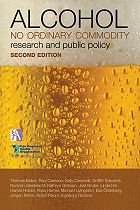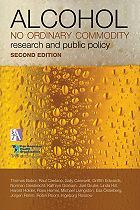Alcohol: No Ordinary Commodity – Second Edition
A new and updated edition of the book Alcohol: No Ordinary Commodity is now available from Oxford University Press, written by an international group of alcohol researchers under the leadership of Professor Thomas Babor (picture below).
 The Second Edition of Alcohol: No Ordinary Commodity has the same scope as the version from 2003; a guide to how to understand alcohol-related harm and how such harm most effectively can be prevented by policy interventions. The authors describe the conceptual basis for a rational alcohol policy and present new epidemiological data on the global dimensions of alcohol misuse.
The Second Edition of Alcohol: No Ordinary Commodity has the same scope as the version from 2003; a guide to how to understand alcohol-related harm and how such harm most effectively can be prevented by policy interventions. The authors describe the conceptual basis for a rational alcohol policy and present new epidemiological data on the global dimensions of alcohol misuse.
The core of the book is a critical review of the cumulative scientific evidence in seven general areas of alcohol policy: pricing and taxation, regulating the physical availability of alcohol, modifying the environment in which drinking occurs, drinking-driving countermeasures, marketing restrictions, primary prevention programs in schools and other settings, and treatment and early intervention services. The final chapters discuss the current state of alcohol policy in different parts of the world and describe the need for a new approach to alcohol policy that is evidence-based, realistic, and coordinated.
Alcohol as a global commodity
 Many chapters have been revised and updated with new data. While the core message remains the same in the new edition, readers who are familiar with the first version will also find several interesting changes. More emphasis is now on alcohol as a commodity in the global market place. This is reflected in a new chapter on the global structure and strategies of the alcohol industry and also more material on the role of international trade agreements in promoting.
Many chapters have been revised and updated with new data. While the core message remains the same in the new edition, readers who are familiar with the first version will also find several interesting changes. More emphasis is now on alcohol as a commodity in the global market place. This is reflected in a new chapter on the global structure and strategies of the alcohol industry and also more material on the role of international trade agreements in promoting.
The new edition also comes out with more material and a stronger message on the need to regulate alcohol marketing. The authors point at the fact that “there has been a marked increase in alcohol marketing using an expanding repertoire of media and communication technologies with considerable appeal and utility for young people. There are unprecedented levels of exposure to sophisticated marketing”.
A consumer's guide
In the last section of the book – “A consumer’s guide - 42 different policy options to reduce alcohol related harm are evaluated, compared to 32 options in the edition from 2003. This rating table represents also this time the accumulated scientific knowledge on alcohol research that has a direct relevance to the development of alcohol policy on local, national, and international levels – presented in a in a practical and readily accessible form.
Alcohol: No Ordinary Commodity can be ordered from Oxford University Press (£ 24,95) and other online book shops.
Table of contents:
1: Setting the policy agenda
2: Alcohol: no ordinary commodity
3: Alcohol consumption trends and patterns of drinking
4: The global burden of alcohol consumption
5: The alcohol beverage industry: global structure and strategies
6: International context of alcohol policy
7: Strategies and interventions to reduce alcohol-related harm
8: Controlling affordability: pricing and taxation
9: Regulating the physical availability of alcohol
10: Modifying the drinking context: reducing harm in the licensed drinking environment and other contexts
11: Drinking and driving prevention and countermeasures
12: Restrictions on marketing
13: Education and persuasion strategies
14: Treatment and early intervention services
15: The policymaking arena: Putting alcohol policies into effect
16: Alcohol policies: a consumer's guide
RELATED ARTICLES
- New report highlights benefits of policy measures to prevent harmful alcohol consumption
- Alcohol use - a barrier to health and to the achievement of the SDGs
- Government investments in alcohol industry up against the wall
- Abstracts for GAPC 2020 – deadline 29 July 2019
- A regional African alcohol coordination mechanism is needed
- New book reveals a series of unethical business practices by Heineken in Africa
- Next GAPC to be held in Dublin in March 2020
- Trouble Brewing
- SAFER – a new WHO initiative to boost national alcohol policy processes
- WHO Launches Global status report on alcohol and health 2018

